68 years ago today, the renegade travel host and chef Anthony Bourdain, was born. With his food and culture show, No Reservations, and the groundbreaking book, Kitchen Confidential: Adventures in the Culinary Underbelly, he became known as “the culinary bad boy”. The pair catapulted him to stardom, resulting Parts Unknown, the definitive American travel program on basic cable. It ran for over 60 episodes before being interrupted tragically by Bourdain’s death by suicide. READ more… (1956)
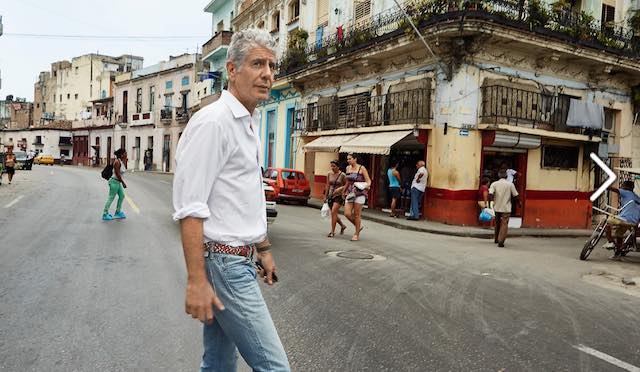
An executive chef for many years while being a heroin addict for a time, the New Yorker eventually recovered and “changed the voice of food”. On the day of his death, GQ ran a piece calling him the “heir to Hunter S. Thompson” in American writing.
Something of a Renaissance man, Bourdain was a blue belt in Brazilian Jiu-Jitsu and even took the gold medal in the middleweight division at the IBJJF Spring International in 2016. Always holding a sharp opinion, he filmed honestly the apartheid state of Palestine and dismissed as racist America’s obsession with seeing China as a rival. (1956)
More Good News from this Day in History:
- The Diary of Anne Frank was published (1947)
- Prince released his sixth studio album Purple Rain (1984)
- Croatia and Slovenia declared their independence from Yugoslavia (1991)
- Kim Campbell was chosen to lead the Progressive Conservative Party of Canada—and she became the first and only female Prime Minister of Canada, the first baby boomer to hold that office, and the only Prime Minister born in British Columbia (1993)
- The US Supreme Court by a vote of 6-3 upheld the government’s right to provide health coverage subsidies to residents of any state that relies on the federal insurance exchange established by the Affordable Care Act (2015)
114 years ago today, Igor Stravinsky’s ballet The Firebird premiered in Paris’ Palais Garnier, bringing international acclaim to the Russian. Based on a Russian fable of a magical bird and an immortal wizard. Its debut was heralded for Stravinsky’s “delicious” musicianship, and the ballet’s exceptional balance. The backcloth of the stage was quite old, and lent according to one critic, “a formula identical with that of the shimmering web of the orchestra”.
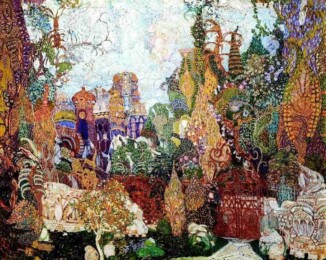
The ballet centers on the journey of its hero, Prince Ivan. While hunting in the forest, he strays into the magical realm of the evil Koschei the Immortal. Later Ivan does battle with Koschei, and uses The Firebird’s help to break Koschei’s spell of immortality, as well as that of mind control over 13 princesses, one of whom Ivan falls in love with.
Stravinsky used several of Rimsky-Korsakov’s musical ideas in The Firebird, most notably in the use of leitmotifs. On the other side, The Firebird has influenced and been sampled by many 20th-century musicians including Frank Zappa when he was playing with The Mothers of Invention, the progressive rock band Yes, John McClaughlin, and others.
During its time, Sergei Rachmaninoff said of the music: “Great God! What a work of genius this is! This is true Russia!” Another colleague, Claude Debussy, who later became an admirer took a more sober view of the score: “What do you expect? One has to start somewhere.” Wagner reportedly said to Stravinsky in private that he should have started the ballet with a sudden crash rather than the extra slow, pianissimo. WATCH the performance below… (1910)
124 years ago today, the Dunhuang Manuscripts were discovered in a sealed natural vault within the Mogao Caves by the Taoist monk Wang Yuanlu. Their pages are scrawled with many languages, including Chinese, Old Uighur, Tangut, Hebrew, Songdian, Sanskrit, proto-Turkish, Prakrit, Kuchean, and dozens more besides. A truly remarkable variety of material is covered, from the natural to the human sciences, and histories from around the continent.
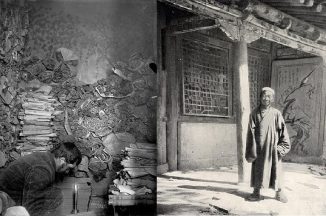
The majority of the surviving texts come from a large collection of documents produced between the late 4th and early 11th centuries which had been sealed in the so-called ‘Library Cave’ (Cave 17) at some point in the early 11th century.
Among the texts are the Dunhuang Star Chart, one of the oldest extant star charts, that dates from the Tang Dynasty. Believed to be from the 7th century, it shows each of the lunar months with a total of 1,345 stars in 257 constellations clearly marked and named. Found in Library Cave was also the pharmacological text, Bencaojing jizhu, which is still consulted today for traditional Chinese medicine.
There are numerous religious commentaries and writings, which include everything from Manichaeism—the texts of the Parthian prophet Mani, Jewish selihot prayers, Nestorian Christian material, and a famous commentary on the Confucian Analects. There are many copies of the Diamond and Lotus sutras, and also the Buddhist narratives called bian wen, as well as much of the material that colored the history of Zen in China.
Beyond these, the Dunhuang Manuscripts contained contemporary literature like the Wang ocheonchukguk Jeon, a travelogue from a Korean Buddhist traveling to India, musical scores meant to be paired with dancing, folk songs, and folkloric material, social documents, such as contracts, account books and loan receipts, and several contemporary and then-older histories. (1900)
28 years ago today, the science fiction action film Independence Day premiered.
Starring Jeff Goldblum, Will Smith, Judd Hirsch, and Randy Quaid, a disparate group of people converge in the Nevada desert in the aftermath of a worldwide attack by extraterrestrial beings. They join the world to launch an all-out counterattack on July 4—Independence Day in the U.S.
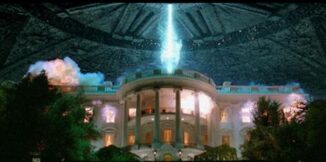
Directed and co-written by Roland Emmerich, it became a significant turning point in the history of the Hollywood blockbuster, at the forefront of the large-scale disaster film genre. The performances, and especially the Oscar-winning visuals, were praised, and the production grossed over $817.4 million worldwide, becoming the second-highest-grossing film ever at the time, behind Jurassic Park.
Independence Day was marketed with several taglines, including: “We’ve always believed we weren’t alone. On July 4, we’ll wish we were.” WATCH the exciting trailer…(1996)
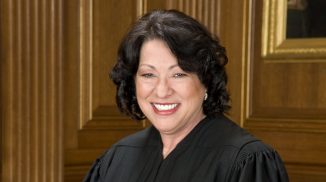
Happy Birthday to Justice Sonia Sotomayor, who turns 70 years old today. Born to a poor Puerto Rican family living in the Bronx housing projects, she rose to become the first Hispanic justice on the U.S. Supreme Court. Her father, who did not speak English, had a third-grade education and died when Sonia was nine. She was inspired to become a judge while watching the Perry Mason television series and recalled that her mind was made up: “I was going to college and I was going to become an attorney, and I knew that when I was ten.” After graduating from Princeton and Yale on full scholarships, she eventually became a lawyer in private practice before, in 1991, being nominated to the U.S. District Court by Republican President George H. W. Bush.
She is also the author of several books, including a children’s book, Just Ask!: Be Different, Be Brave, Be You. (1954)

And on this day in 1967, the first live television show via satellite was watched internationally by an estimated 400 million people. Our World featured segments produced in 14 countries on 5 continents (like, Marshall McLuhan in Canada and Pablo Picasso in Spain). The Beatles performed live, debuting a song specially composed for the occasion, ‘All You Need Is Love’, with backing vocals provided by Mick Jagger, Keith Richards, Eric Clapton, Graham Nash, Keith Moon and Marianne Faithfull. (WATCH some of the Our World broadcast below. The Beatles portion, previously available on YouTube, is blocked for copyright reasons.)
And, Happy Birthday to Carly Simon, who turns 79 today. The singer–singer-songwriter-musician rose to fame in the 1970s and pumped out a string of both original hits—Anticipation, You Belong To Me, Haven’t Got Time for the Pain, The Right Thing to Do—and non-original hits including Nobody Does It Better, from the 1977 James Bond film The Spy Who Loved Me, and Mockingbird (the duet with former husband James Taylor).
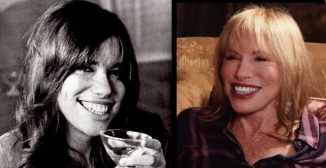
But, it was the iconic You’re So Vain that became a worldwide hit, turning Platinum and earning her 3 Grammy nominations, including Record of the Year and Song of the Year. After keeping a secret for decades, Simon revealed that Vain was, in fact, about Warren Beatty—but just one verse. FUN FACT: Mick Jagger contributed backing vocals for the song.
With her contralto vocal range, she recorded Let the River Run for the film Working Girl. The song won her a Grammy Award, an Academy Award, and a Golden Globe Award—becoming the first artist to do so, having composed, written, and performed the track entirely on her own.
She wrote two memoirs (Boys in the Trees), and is the author of several children’s books, including Amy the Dancing Bear and Midnight Farm. In October 2019, she released a second memoir that recounts her friendship with former First Lady Jacqueline Kennedy Onassis, entitled, Touched by the Sun: My Friendship with Jackie. WATCH an honest interview from 20 months ago… (1945)
Share the Milestones, Memories, and Music…



















